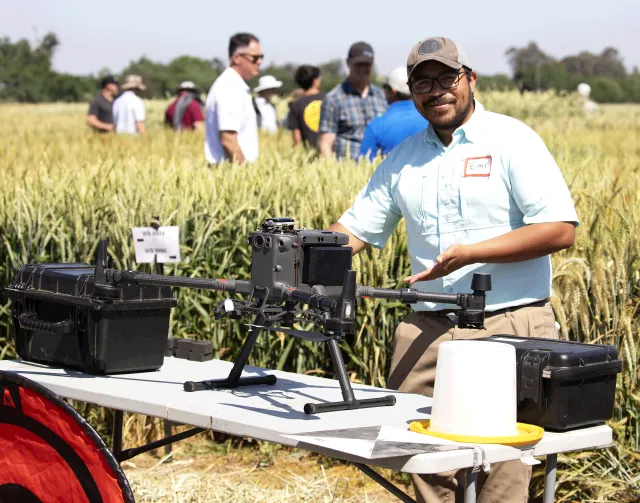Equal Access for All and the Benefits of Belonging
UC ANR Vision 2040 empowers us to build the skills and knowledge to strive for UC ANR to be valued in every California Community for meaningful engagement and making a positive impact in people's lives. To achieve this vision and our mission as an organization, we need to develop the knowledge, understanding and strategic skillset to effectively engage with the complexities of our communities through equitable strategic plans that foster inclusion and belonging for every person throughout the State of California and within UC ANR.

On this page:
Civil Rights
Anti-racist information
Cultural Awareness & Competence
Cultural Competence in Field work
Principles of Community
Working with Latinos
Employee Resource Groups (UC ANR)
Accessibility
What is it?
Who needs it?
Why does it matter?
What products will UC ANR make accessible?
Where can I find other resources to learn how to make my products and services accessible? Accessibility (UC ANR Web)
Civil Rights
The UC ANR Office of Civil Rights ensures compliance with nondiscrimination and civil rights policies, provides training and investigative support, and offers resources to promote equity and accessibility across all programs.
Anti-racist information
Visit this page to guide you into understanding racism. Find many resources on the Anti-racist information (UC ANR Web).
Cultural Awareness & Competence
Cultural competence is the ability to effectively interact and form meaningful relationships with individuals from differing backgrounds. It involves a lifelong process of enhancing self-awareness, social skills, and behaviors related to cultural awareness, and developing the capability to advocate for others. Unlike mere tolerance, which implies overlooking differences, cultural competence requires recognizing and respecting those differences in all contexts through words and actions. Learn more on the Cultural Awareness & Competence web page.
Workplace Inclusion & Belonging
The Workplace Inclusion and Belonging (WIB) unit works across all of UC ANR to collaboratively support the vision of an inclusive workplace that fosters an environment where each colleague feels respected, appreciated, and valued. Workplace Inclusion & Belonging (UC ANR Web)
Cultural Competence in Field work
To learn about timely, challenging topics led by subject matter experts, presented online in workshop format with example scenarios, practice skills, and planning guidance to promote safe teaching and research outdoors, at remote sites, and abroad refer to Creating, Enforcing, and Promoting Safe Field Work Culture for All (UC Berkeley web page).
Unconscious Preferences
The Implicit Association Test (IAT) at Project Implicit allows individuals to explore their unconscious preferences or biases related to various topics such as race, gender, and age. Participants select a test, optionally report their attitudes, and receive interpretations based on research from leading universities. Data privacy is ensured through SSL encryption, and participants must be 18 or older. Take the Project Implicit test (Harvard University Website) and learn about yourself.
UC Managing Implicit Bias Series
This is a set of six virtual learning modules designed to increase awareness of implicit bias and reduce its impact at the University. Complete the UC Managing Implicit Bias Series (Course link) (UC Learning Center).
Principles of Community
In this speech, Martin Luther King Jr. emphasized that land-grant universities were originally intended to democratize education and provide opportunities for the working class. In this speech (Ohio Northern University) Dr. King points to the fact that the benefits were historically restricted to white people, while Black and Indigenous communities were largely excluded. Martin Luther King Jr. Speech on the Land Grant System. (YouTube).
Working with Latinos
Latino Youth Development
The vision of the UC ANR 4-H Latino Initiative is to: Develop, deliver, and assess cultural responsive program models to attract and retain Latino youth, families, and volunteers into 4-H. Latino youth development (UC ANR 4-H Webpage)
Building Partnerships with the Latino Community
The Hispanic or Latino community represent 39.4% of Californians. They bring a wonderful array of cultural and economic richness to the state. Building partnerships with the Latino community helps address Latino youth needs, and everyone may benefit from Latino community resources. Building Partnerships with the Latino Community (Fact sheet)
Three tools for Asset Mapping
Asset-based mapping helps you understand your community so that you can better incorporating community strengths and partnerships into your work for increased impact. Three tools for Asset Mapping (Fact Sheet)
Designing Programs for LatinX Youth
From the links below download any of the five series practitioner briefs for 4-H and youth development professionals to use when designing a program to increase program participation by Latinx youth.
